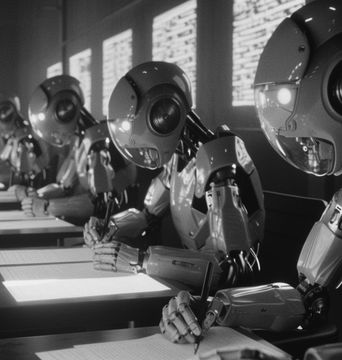AI ACES COLLEGE EXAMS: UNDETECTABLE AND OUTPERFORM HUMANS, FUTURE OF EDUCATION AT RISK!

Artificial Intelligence (AI) continues to infiltrate various sectors in unprecedented ways, and most recent data suggests that education is no exception. A ground-breaking study at the University of Reading, UK, shows that AI has not only the ability to pass college exams undetected but also to outperform human students.
The researchers carried out this landmark experiment by secretly submitting AI-generated exam answers across five undergraduate psychology modules. The results were astonishing: 94% of these AI submissions went unnoticed by the human examiners in charge of grading.
In a comparison of performance, the AI-generated answers were found to score half a grade boundary higher on average than the submissions of actual human students. This not only showcases the proficiency of AI in mimicking human thinking but also calls into question the integrity and value of academic assessments.
The implications of these results are far-reaching and potentially disruptive. Universities could face growing challenges in securing the integrity of their exams, and the overall value of their degree offerings might come under scrutiny in the face of formidable AI technology.
Beyond institutional concerns, the implications for the broader job market and the very conceptualization of learning and knowledge are just as significant. Employers might start questioning the reliability of academic credentials, given the undetectable infiltration of AI in examinations. The very nature of learning, traditionally viewed as a uniquely human endeavor, may need to be reevaluated in light of such technological advancements.
Despite these profound challenges, the research team insists the findings should inspire proactive countermeasures rather than serve as grounds for criticism of existing educational practices. The researchers urge the education sector to explore ways to leverage the power of AI without undermining the genuine value of human learning.
Currently, methods used to detect AI-generated content fall dramatically short— an inadequacy that mandates evolution within the education sector. Furthermore, accepting the reality of a future where AI is woven into the educational fabric could yield new opportunities for enhanced learning experiences.
One such prospect is the integration of AI in the learning process not as a destructive force but as a supplementary instrument that fosters human education. AI could help create more tailored learning paths, adapt educational content to individual needs, and assist educators in focusing on complex, conceptual errors rather than simple information gaps.
The study, however, is not without limitations. Conducted with the AI model GPT-4, it took place at a single university and within one discipline. This leaves open the question of whether different outcomes might be obtained with different AI systems or in different disciplinary contexts.
Regardless, the University of Reading’s experiment is a crucial eye-opener, shedding light not only on AI's remarkably imperceptible abilities but also on the pressing need for educational adaptations. It underscores the necessity— and indeed, the inevitability— of a marriage between education and technology, inevitably shaping the future of learning.